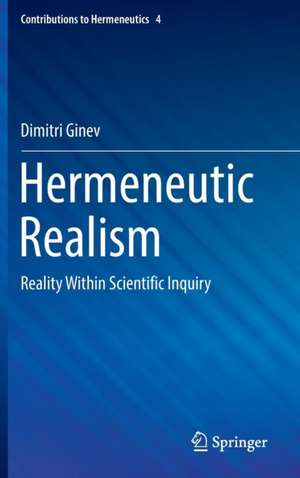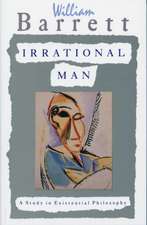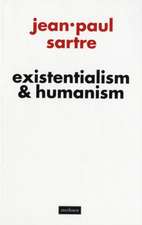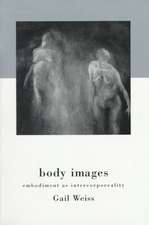Hermeneutic Realism: Reality Within Scientific Inquiry: Contributions to Hermeneutics, cartea 4
Autor Dimitri Gineven Limba Engleză Hardback – 12 sep 2016
| Toate formatele și edițiile | Preț | Express |
|---|---|---|
| Paperback (1) | 388.90 lei 6-8 săpt. | |
| Springer International Publishing – 22 apr 2018 | 388.90 lei 6-8 săpt. | |
| Hardback (1) | 396.24 lei 6-8 săpt. | |
| Springer International Publishing – 12 sep 2016 | 396.24 lei 6-8 săpt. |
Preț: 396.24 lei
Nou
Puncte Express: 594
Preț estimativ în valută:
75.82€ • 79.16$ • 62.75£
75.82€ • 79.16$ • 62.75£
Carte tipărită la comandă
Livrare economică 04-18 aprilie
Preluare comenzi: 021 569.72.76
Specificații
ISBN-13: 9783319392875
ISBN-10: 3319392875
Pagini: 360
Ilustrații: XIV, 291 p.
Dimensiuni: 155 x 235 x 19 mm
Greutate: 0.61 kg
Ediția:1st ed. 2016
Editura: Springer International Publishing
Colecția Springer
Seria Contributions to Hermeneutics
Locul publicării:Cham, Switzerland
ISBN-10: 3319392875
Pagini: 360
Ilustrații: XIV, 291 p.
Dimensiuni: 155 x 235 x 19 mm
Greutate: 0.61 kg
Ediția:1st ed. 2016
Editura: Springer International Publishing
Colecția Springer
Seria Contributions to Hermeneutics
Locul publicării:Cham, Switzerland
Cuprins
Chapter 1- Introductory: On the Very Idea of Hermeneutic Realism.- Chapter 2- The Production of Objectified Factuality within the Facticity of Scientific Inquiry.- Chapter 3- Intermediate Reflections: Reflexivity in Scientific Inquiry and Empirical Ontologies of Hybrid Objects.- Chapter 4 - Meaningful Articulation and Objectification of Reality in Scientific Inquiry.- Chapter 5- Conclusion “Texts”, Relevant Contexts, and Textualizing.
Notă biografică
Dimitri Ginev has taught at the University of Western Kentucky and Sofia University. He was a Guest Professor at the Collegium Helveticum, ETH Zuerich, and Senior Fellow at the Zukunftskolleg, University of Konstanz. He was Fulbright Scholar, an Alexander-von-Humboldt scholar and head of 11 international academic projects. He is the founder and editor of the international journal “Studia Culturologica”. Author of more than 400 scientific publications. Dr. Ginev has previously published with Springer one authored book and edited or co-edited three volumes.
Textul de pe ultima copertă
This study recapitulates basic developments in the tradition of hermeneutic and phenomenological studies of science. It focuses on the ways in which scientific research is committed to the universe of interpretative phenomena. It treats scientific research by addressing its characteristic hermeneutic situations, and uses the following basic argument in this treatment: By demonstrating that science’s epistemological identity is not to be spelled out in terms of objectivism, mathematical essentialism, representationalism, and foundationalism, one undermines scientism without succumbing scientific research to “procedures of normative-democratic control” that threaten science’s cognitive autonomy. The study shows that in contrast to social constructivism, hermeneutic phenomenology of scientific research makes the case that overcoming scientism does not imply restrictive policies regarding the constitution of scientific objects.
Caracteristici
Is the first to develop the tradition of hermeneutic theory of scientific practices and the constitution of scientific objects Suggests a strategy for overcoming scientism without jeopardizing science’s cognitive autonomy Advances the dialogue between phenomenology of science, cultural studies of science, and science and technology studies





























